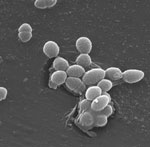Archived: Gut Microbes Can Inactivate Cardiac Drugs

Doctors have known that a medication often prescribed to treat heart failure is inactivated by gut microbes, particularly a bacterial species called E. lenta. Now scientists have a better understanding of why. A Harvard University research team led by Peter Turnbaugh found that the heart drug digoxin turns on two E. lenta genes that help convert the drug into its inactive form, thereby making the medicine less effective. By measuring gene abundance, the scientists could reliably predict whether a microbial community could break down the drug. The researchers also identified a possible way to stop the process: add protein. Their studies using mice showed that a diet high in protein—and the amino acid, arginine, that helps E. lenta grow—increased digoxin absorption. These initial findings suggest that one day it may be possible to tailor digoxin therapy through diet modifications.

